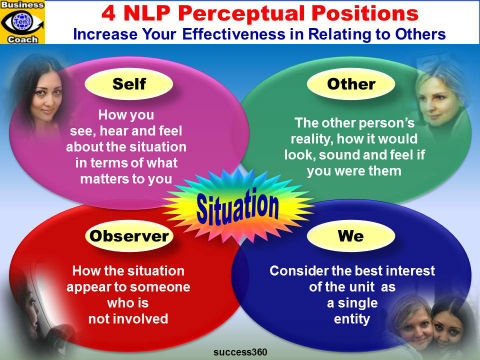|
Strive to understand your and
other people’s perceptions if you wish to learn how to control
your state of mind and enhance your communication.
Don't forget that your and your
prospect's map of the reality is not the same – the meaning of
the same thing is different for different people.
|
|
Win-Win Negotiation |
|
|
 |
| |
NLP Technology of Achievement:
Exploring Relationships |
|
| |
1.
Self
The first Neuro-linguistic
perceptual position “Self” is a total
self-reference, and operates from the self or from ones own
eyes. Explore what you think about the relationship. Label
both your own and the other person's behavior. Change the
state – shake off all bad feelings. |
| |
2.
Other
The second perceptual position
“Other” enhances your ability to empathize. It
gives you the ability to see another person’s logic
especially when you are in an argument. You can also get
some insight into your behavioral characteristics, and what
someone else thinks about you. It is also an important model
for strengthening rapport. Explore the relationship from the
other person's point of view. Imagine how they experience
your behavior. What sort of label would they put on it? How
do they feel? Shake off that emotional state before
continuing. |
| |
3.
Observer
The third Neuro-linguistic
perceptual position “Observer” is a complete
dissociation from the entire conversation or experience. Go
outside the relationship, become a detached observer –
imagine a stage and see both of you on stage. See that other
person doing what they do, and see yourself responding to
them.Shift your question from 'How can I change that
person's behavior?' to 'How am I reinforcing or triggering
that person's behavior?' Explore how else you could respond
to him or her. |
| |
4.
We
The fourth perceptual
position, defined as a “We”, is the viewpoint
from the perspective of the system as a whole. In order to
take the fourth perceptual position, step aside and take on
the perspective of the whole arrangement by considering the
best interest of the unit as a single entity. Associate
yourself with the whole system. Here your aim is to
contribute to this single unit, by considering “our” common
goals. |
|